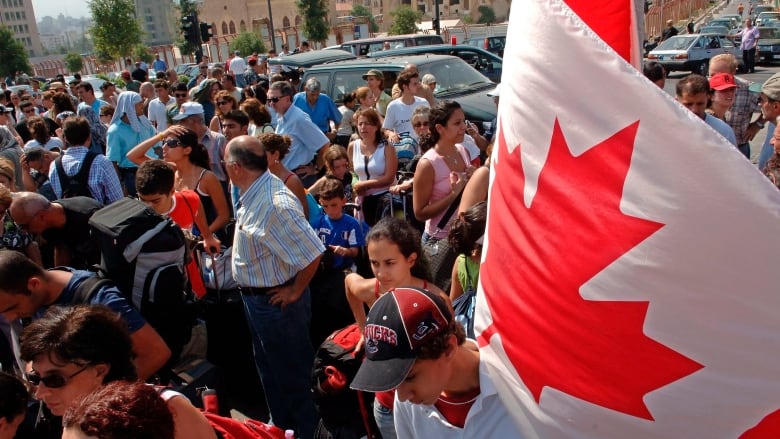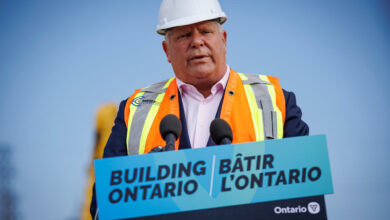Canada ends evacuation flights out of Israel and turns attention to possible Lebanon rescue
The last planned Canadian Armed Forces (CAF) evacuation flight from Israel left Monday as the federal government wound down one evacuation operation while preparing for another one.
Ottawa is now planning for the prospect of another, much larger evacuation effort in Lebanon, which could be dragged into the ongoing Israel-Hamas conflict.
Canada has so far helped about 1,600 Canadian citizens, permanent residents and eligible family members leave Israel, along with a number of foreign nationals. There have been 19 such “assisted departure” flights out of Tel Aviv over the last 10 days, says Global Affairs Canada (GAC).
In Lebanon, meanwhile, roughly 16,500 citizens have so far registered with the government — suggesting the number of people who may need help fleeing Lebanon could be ten times the number Ottawa pulled out of Israel.
And the registration numbers don’t tell the whole story. An estimated 40,000 to 75,000 Canadians are living in Lebanon at any given time, according to government data.

In preparation for a possible evacuation, the CAF has deployed personnel to Lebanon’s capital Beirut and to Cyprus, the Mediterranean island that’s been used as a rescue point in the past.
“We will be ready,” said Defence Minister Bill Blair at a Friday event.
“We’re making plans and preparation to be able to react if we have to, so we can do it quickly in order to save Canadian lives if that should occur,” Maj.-Gen. Darcy Molstad told a press briefing.
Canada’s been here before; the federal government pulled roughly 15,000 people, most of them dual nationals, from Lebanon in 2006. It was a controversial measure that cost the federal treasury nearly $100 million.
Two senior officials who helped orchestrate that evacuation told CBC News Canada is better prepared for a rescue than it was back then, but it’s still a daunting task.
“In 2006, we were scrambling,” said Ontario Sen. Peter Boehm, a former top diplomat who chaired the government’s task force on the evacuation.
“Canada has a very good consular affairs system and we did at that time too, but nothing that was ready for this sort of magnitude.”
Boehm said that after that “stressful” evacuation — which took a team of politicians, diplomats and public servants “working flat out 24/7” — Canada developed a new set of best practices.
There’s now a standing rapid deployment team (SRDT) that be can be quickly deployed to help with evacuation efforts, he said.
The government also built an emergency operations centre in Ottawa.

There’s a dedicated team of staff helping with consular issues around the clock by phone and email, which relieves the pressure at Canada’s lightly staffed embassies.
GAC also now has more experience with such operations, having rescued stranded Canadians in the early days of COVID-19 and having brought citizens in Sudan to safety earlier this year.
“There’s a greater sense of being more agile. But you will always have cases that fall between the cracks for one reason or another,” Boehm said.
“That’s why the government has gone out with a call saying, ‘OK, you might want to think about leaving because we don’t know what the situation is going to be and to what extent we can help you.'”
Abdallah Bou Habib, the Lebanese foreign affairs minister, insisted Sunday that his government does not want war.
“We have been very afraid and very worried that the war could spread. That’s the last thing we want,” he said.
But Hezbollah, the powerful Iranian-backed militia that controls parts of Lebanon, may have other ideas.
Since the deadly Hamas attack on Israeli civilians of Oct. 7 and Israel’s military response to Hamas in Gaza, Hezbollah has launched air strikes on targets in northern Israel.
Israeli defence forces have responded with strikes of their own, targeting what they call Hezbollah missile launch sites in Lebanon.

During a visit with soldiers in the area, Israeli Prime Minister Benjamin Netanyahu warned Hezbollah that it would be making “the mistake of its life” if it entered the conflict. “We will cripple it with unimaginable force,” he said.
GAC last week ramped up its travel warning for Lebanon. The department is advising against all travel there due to the deteriorating security situation and the threat of unrest in a country that already was teetering on the edge of collapse due to sky-high unemployment and acute financial distress.
“Canadians should not travel to Lebanon for any reason,” Julie Sunday, an an assistant deputy minister at GAC, told reporters at a briefing.

Foreign Affairs Minister Mélanie Joly said Monday Canadians should leave Lebanon while they have the chance.
“It’s time to come home. I’ve been saying that for many days,” she said at a press conference. “There are still commercial options available.”
Joly dodged a question about whether the Canadian government would pay for any evacuation.
Louis de Lorimier, Canada’s ambassador to Lebanon during the 2006 evacuation, said the former Conservative government decided to wave all of the costs associated with the rescue.
The government might want to rethink paying for these emergency departures, given Canadians in Lebanon have been told for days that it’s time to leave, he said.

“The question is, should Canada foot the bill for that completely as it did before?” de Lorimier told CBC News.
“In 2006, there was no advance notice of anything. But now the Beirut airport is open. There are flights to European capitals. The situation is different this time around.”
In that 2006 conflict, Israel bombed the Beirut airport the day after a Hezbollah raid and declared its northern neighbour’s airspace closed.
That forced the Canadian government to get people out on boats because the airport was largely inoperable and land routes were considered too dangerous, de Lorimier said.
Today, however, multiple routes operated by Royal Jordanian Airlines, Middle East Airlines and Turkish Airlines are still connecting Beirut to global hubs like Instabul, Paris and Frankfurt.
The cost to taxpayers isn’t the only factor, de Lorimier said.
Rescuing people who don’t leave voluntarily could put Canada’s soldiers at risk, he said.
He said he witnessed first-hand the bravery of Canada’s military when special forces staged a harrowing rescue of citizens stuck in a bombed-out Lebanese city.
“We were able to do that because of the extraordinary professionalism of our armed forces. It was super,” he said.
CBC/MS









Redes Sociais - Comentários